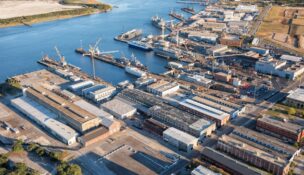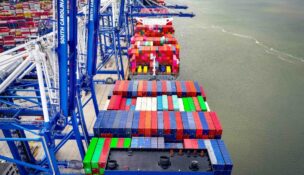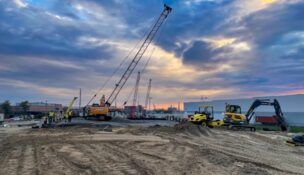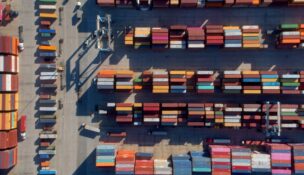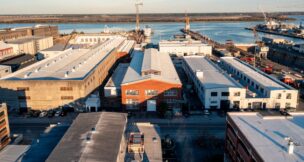How this Charleston startup uses tech to track cargo across the globe
Contributing Writer //October 13, 2023//
How this Charleston startup uses tech to track cargo across the globe
Contributing Writer //October 13, 2023//
As COVID-19 brought the global supply chain into focus with myriad disruptions, it became clear the lack of visibility in overseas shipments needed to be addressed.
It also marked a turning point in the future of logistics, as it was clear new tools and technology would be necessary to avoid similar problems in the future. Enter: Gnosis Freight.
At any given point, many businesses aren’t aware of where shipments are or they get inaccurate, inconsistent data, according to Adam Baker, Gnosis Freight’s vice president of customer experience. Many companies are racking up millions of dollars in detention and demurrage charges without much control and often not even knowing until it’s too late.
Simply put, Gnosis Freight offers supply chain execution tools that help cut through the blind spots of international shipments and keep logistics teams fed with the information that’s most relevant to them and as close to real-time as possible. That gives teams better visibility and lets them know when disruptions spring up. Or what logistics professionals refer to as “exceptions.” That gives them information that will allow them to triage any potential supply chain disruptions.
Gnosis Freight doesn’t actually touch any of the freight. However, it remains a part of the process for the whole lifecycle of the container, from when the purchase order is made to the time the empty container is returned to the terminal.
Changing the way logistics teams work
Founded in 2017 in Charleston, Gnosis Freight set out to change the way logistics teams work. It was already in business by the time the pandemic hit, but the influx of imports brought new focus to the business’s efforts to streamline the process of global shipments.
According to its website, Gnosis Freight’s goal “is understanding the most critical pain points in their customer’s supply chains and addressing them head-on.”
The seismic shift in consumer spending during the pandemic meant demand for imported goods surged to new highs. The increased congestion at ports meant shipments were sitting out at sea for long periods. Baker noted that at the peak there were 108 container vessels that were awaiting berth at the ports of Los Angeles and Long Beach.
As shipments would be delayed and sit, businesses were facing increased inventory holding costs and missed sales opportunities. Additionally, when containers would finally get unloaded they would sit at the terminals for days and sometimes weeks resulting in huge demurrage charges for shippers. One story Gnosis Freight notes on its website is from a business who saved more than $12 million in one year thanks to the company’s efforts.
“A company like Gnosis Freight wouldn’t have been possible 20 years ago, or probably even 10 years ago,” Baker said. He added that globalization and more complex supply chains has increased the need for improved data to more advanced software tools to manage shipments and increase efficiencies.
Remaining as close to real-time as possible
Gnosis has what it calls the Container Lifecycle Management platform, a logistics software solution which allows businesses to track and manage their shipments throughout the entire process. While most ocean carriers, ports, terminals and rail carriers offer some kind of tracking information, Baker said, it is usually incomplete and offered through disparate and sometimes outdated technology.
Traditionally information coming from these logistics partners has to be aggregated from emails, multiple spreadsheets, and websites, then analyzed and reformatted by logistics teams. By the time they finish, the data is out of date and the process starts again. Gnosis Freight aggregates all of the needed data and normalizes it into a standard format, trying to remain as close to real-time as possible.
According to Baker, it leads to increased visibility so customers can focus on pressing supply chain disruptions or the highest-priority containers and work more efficiently with their logistics service providers (LSPs).
Baker admits a lot of customers are skeptical about Gnosis Freight’s ability to help them with their biggest logistics problems as there’s been a lot of overpromising and under-delivering in the logistics tech world in the past. However, he notes they get a lot of great feedback from customers who’ve seen a marked improvement in saving money and streamlining their processes.
Gnosis Freight sees their business expanding its reach and becoming the operating system for logistics teams. They don’t see the platform at its full potential yet, but they develop close relationships with their customers which helps them develop innovative new solutions to add to their offerings.
“We’ve had a customer cry on the phone to us because they were so thankful for how we had improved her job and work-life balance,” Baker said. “One even told us she’d quit her job if the company ever got rid of Gnosis Freight.”
Mike McMillan is a contributing writer for SC Biz News.
P






